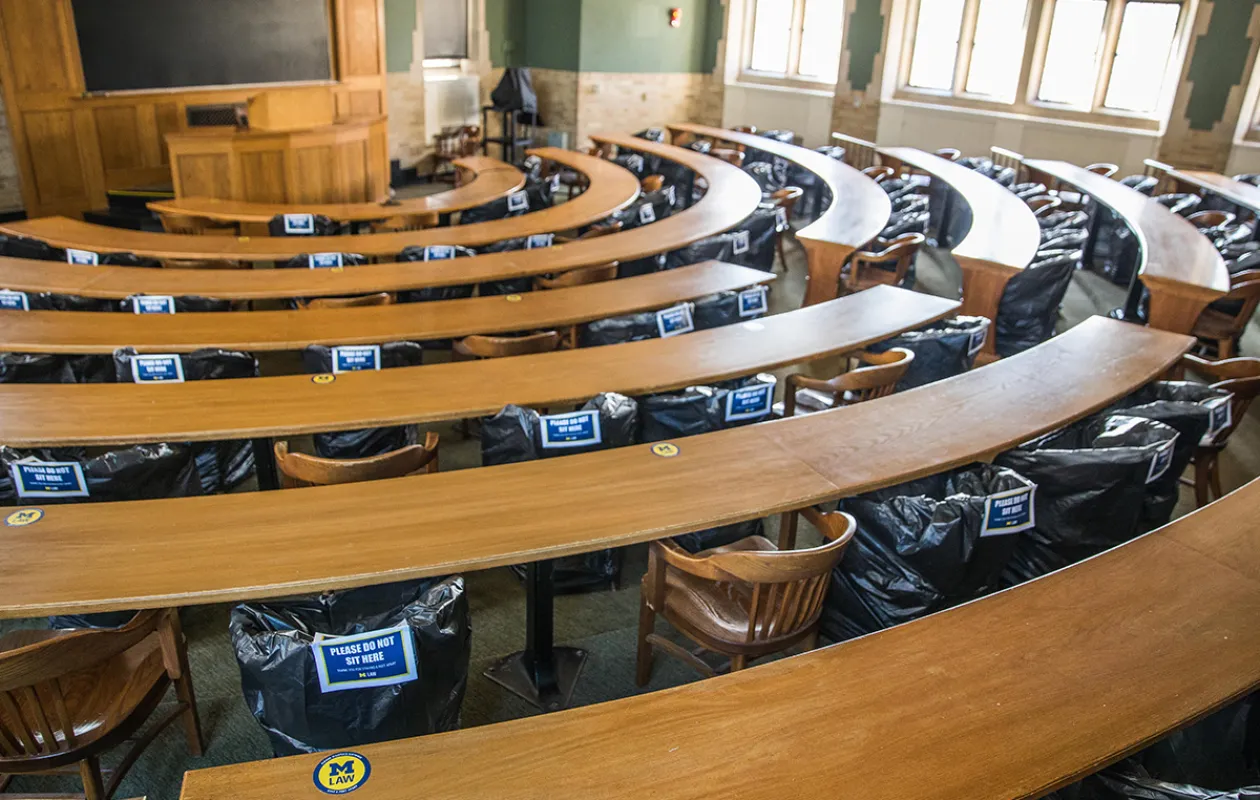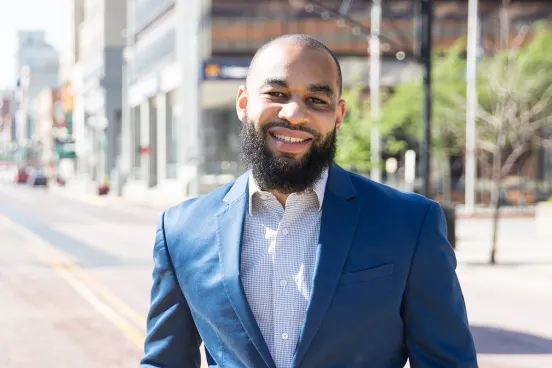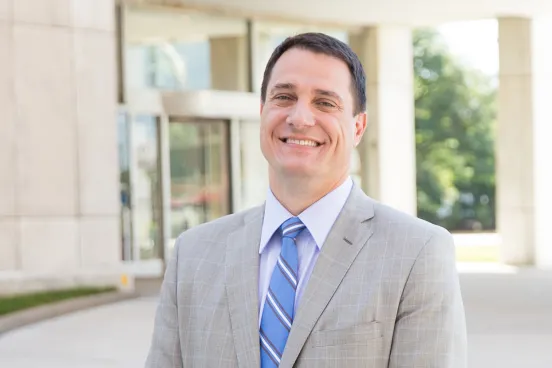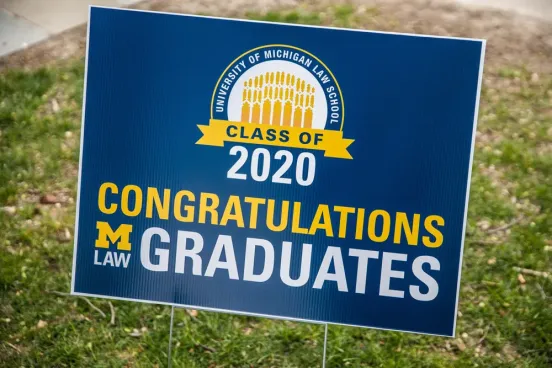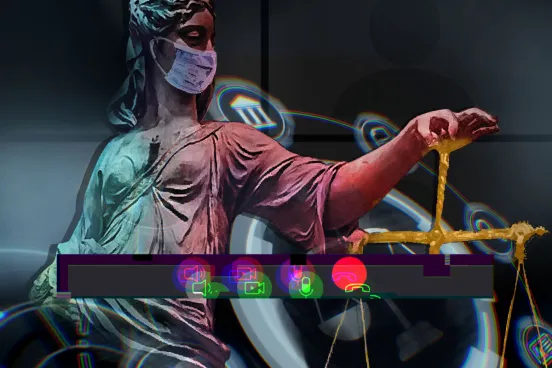On a Thursday morning, stacks of The Michigan Daily carried a front-page proclamation from the president of the University of Michigan: Effective immediately and in response to the spreading global pandemic, all students, faculty, and staff must wear face masks while on campus, walking on nearby streets, and at all University events until further notice. The announcement came on the heels of an order the previous weekend from the Michigan governor that banned all public gatherings until the escalating public health crisis was resolved.
It was October 1918, the governor was Albert Sleeper, the U-M president was Harry Hutchins—dean of the Law School from 1895–1910 and namesake of its iconic academic building—and the disease was a flu virus that would go on to kill tens of millions of people worldwide.
More than a century after the flu pandemic, and midway through the winter 2020 term, current U-M President Mark Schlissel issued similar guidance to the University in a community-wide email about COVID-19. At the time, the pandemic had yet to take hold in the United States and was a substantial but still-nascent threat. That would quickly change.
President Schlissel’s March 11 message cancelled in-person classes for the remainder of the term, among other policy changes around campus activities and U-M programs abroad, and arrived in inboxes less than 24 hours after Michigan Governor Gretchen Whitmer declared a state of emergency and announced the first two confirmed cases in the state (public health officials now believe there were thousands of active cases at the time).
Two days later, the University mandated remote final exams, cancelled all commencements, encouraged students in residence halls to move home or off campus if they were able to do so, and advised administrative managers to send all non-essential staff home who could perform their duties remotely.
By the third week of March, life was unrecognizable in the Quad. Various executive orders from Governor Whitmer further restricted University activity and mandated the closure of the Reading Room, Law Library, and all public spaces in the Law School.

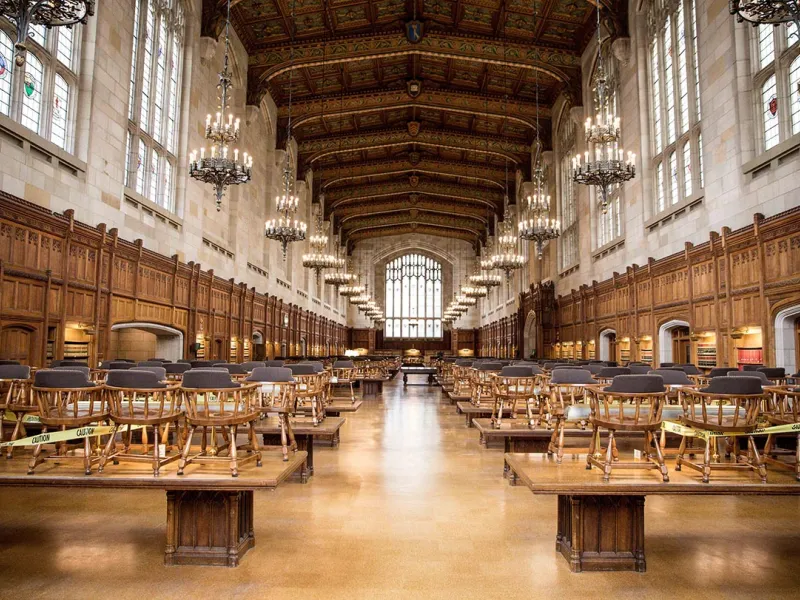 What you have and law school looks like during the beginning of Covid lockdowns
What you have and law school looks like during the beginning of Covid lockdowns
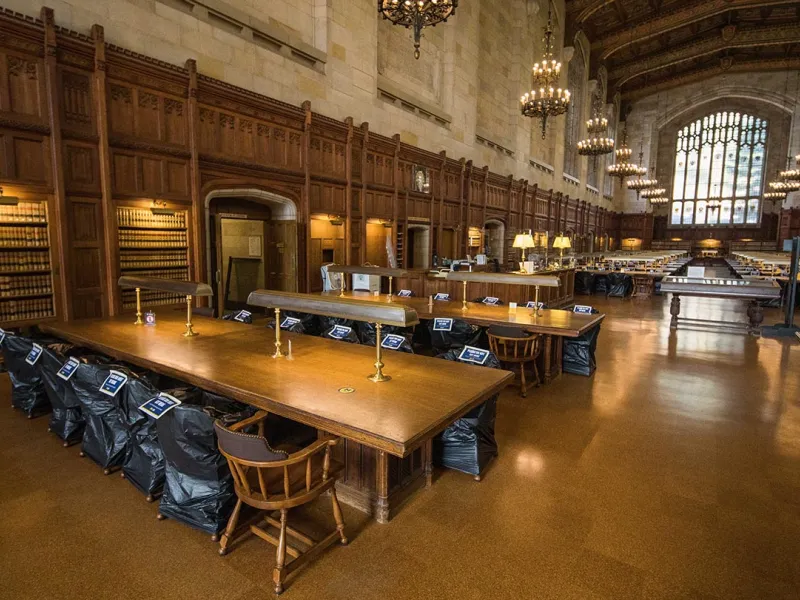 What you have and law school looks like during the beginning of Covid lockdowns
What you have and law school looks like during the beginning of Covid lockdowns
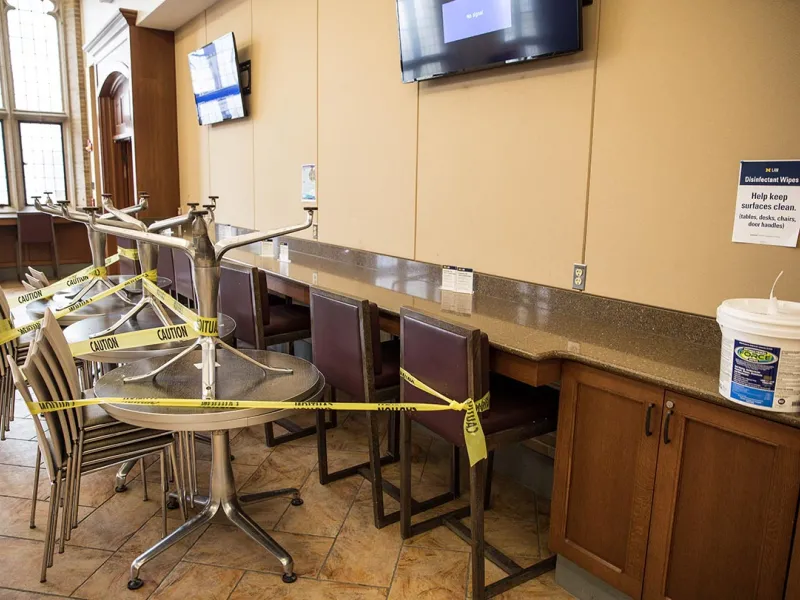 What you have and law school looks like during the beginning of Covid lockdowns
What you have and law school looks like during the beginning of Covid lockdowns
The state’s first stay-at-home order went into effect on March 24 and required Michiganders to remain at home unless their reason for leaving was necessary to sustain or protect life; it also banned all private and public gatherings between those who did not live in the same household.
Residents of the Lawyers Club could retrieve take-out meals from the dining hall but otherwise had to remain in their single-occupancy rooms with private facilities. Students living off campus, as well as faculty and non-essential staff, found themselves barred from the Quad.
As March rolled into April, Michigan Law was reborn in remote classrooms, home offices, and makeshift work and study stations spread across the country and overseas. Students, faculty, building administrators, IT technicians and members of the administration persevered through extraordinarily difficult circumstances.
Within weeks of going remote, skyrocketing case counts and overwhelmed hospital systems revealed the severity of Michigan’s outbreak, and metro Detroit became an early epicenter of what has become a public health catastrophe that continues to this day.
Meanwhile, on campus, public spaces were decontaminated and closed with unsettling strips of off-maize caution tape; chairs were roped off and stacked on Reading Room desks; an early April thaw brought sunshine and false spring to Ann Arbor, with temperatures rising into the 70s; and silence descended on the Law Quad for the first time since construction of the Lawyers Club began in 1923.
Although President Schlissel’s March 11 email marked a monumental turning point, operations at the Law School adapted throughout February and March as University and state guidance changed to reflect the latest understanding of the virus, and to comply with executive orders from the governor’s office. First, sanitation stations were set up throughout the Quad; then public spaces were altered to encourage and allow for social distancing; and by late March access was limited to essential personnel, effectively mandating that Michigan Law transition to an entirely online experience.
Every student, faculty member, and function of the Michigan Law administration was forced to rethink even basic assumptions.
“Reinventing our doctrinal and clinical teaching so it would work in a remote learning environment with students spread throughout the world has been a massive undertaking, and not something we had been planning for. It required monumental effort from our faculty and staff, as well as from our students, who in the midst of dealing with an expanding pandemic managed to make the transition in only a few short days,” says Dean Mark West, Nippon Life Professor of Law. “The situation asked a lot of all involved, but everyone pulled together to stay safe and support one another. It was extremely difficult, especially in the first few weeks. But it was no surprise that the Michigan Law community rose to the occasion.”
The informal Law School COVID-19 response team, formed in February to prepare contingency plans, was by early March meeting daily to consider the many possible outcomes of an outbreak.
“The group was working out of a fourth-floor conference room in Jeffries Hall, and things were developing really quickly. Campuses on the coasts were starting to close, and everything was happening on the fly,” says Michele Frasier Wing, ’98, Michigan Law’s chief operating officer. “One day Dean West came back from a meeting with University officials and said, ‘All of you are too close together, everybody needs to stay six feet apart,’ so we moved to a new conference room where we could social distance and met there daily until it became clear that everybody needed to be working from home.”
Second only to ensuring the health of the Law School community was determining how best to deliver a legal education online. What does it look like to teach constitutional law without the classroom setting for Socratic debate? And how do you run a clinical program without in-person seminars and courtroom experiences? Another question, among many: how does a cold call work in a Zoom classroom?
“Like many of my colleagues, I decided from the very beginning to forgo cold calling on students. Instead, I invited students to sign up before class and opt in to being called on,” says Gil Seinfeld, Robert A. Sullivan Professor of Law and associate dean for academic programming. “For me it was a particularly easy decision because in my capacity as associate dean I was inundated with emails from students relating the incredible challenges that they were confronting. In some cases, students were dealing with financial security issues, food and housing insecurity, and significant mental health challenges; and of course many were managing anxiety about their own health and that of their loved ones. As a teacher, I wanted to do absolutely everything I could to relieve anxiety related to the classroom experience while still delivering something rigorous.”
Law School IT staff convened group and individual training sessions with faculty members to bring them up to speed with videoconferencing platforms, as well as the many other digital tools that were suddenly integral to delivering lectures and running clinical programs.
“Because I didn’t have access to a whiteboard, I decided to get over my career-long disdain for PowerPoint and prepare slides for my students,” says Seinfeld. “A few weeks in, I asked my students if I should keep using slides when we return to in-person classes, and a cascade of 50 yesses came rolling in on the chat, many in ALL CAPS and littered with exclamation points, so it’s something I’ll carry with me back to the classroom. The people have spoken. And they’ve communicated that my long-held view—that unless you’re showing graphs, charts, and the like, heavy reliance on PowerPoint is a kind of pedagogical malpractice—is perhaps somewhat overstated.”
Students who left Ann Arbor for far-flung time zones woke at all hours to attend live Zoom classes. Working parents delivered lectures while young children careened around the house seeking distraction and stimulation, suddenly home all day from shuttered schools. Members of the Michigan Law community lost family members and loved ones, cared for those sick with COVID-19, and battled the virus themselves. Throughout, faculty and students managed to the best of their ability while delivering and participating in the same rigorous curriculum for which Michigan Law is known.
“I was skeptical at the outset about remote classes, but I pretty universally found it to be a good experience, all things considered. It took a lot of effort behind the scenes from faculty and students trying to learn different ways to make it work,” says Austin Del Priore, ’20. “I think we all got better as the weeks went on. I was pretty worried about my seminars, but it just took everyone learning the dynamics, and once we all got there, we still had good conversations.”
“Teaching was difficult, largely because of my inability to read the room,” says Seinfeld. “I’d have 75 students in my class every day, but only nine faces on my screen. There’s a lot of non-verbal communication that goes on in a classroom, and in a virtual setting it’s very difficult to assess the ratio of the engaged nodders to the obviously bewildered. It was really challenging for everyone.”
Outside of the classroom, life at Michigan Law came to an abrupt halt. Student groups were forced to end in-person activities and community events were cancelled, postponed, or moved online. With only two weeks of notice, the Student Funded Fellowships auction was reimagined as an entirely remote event.
“The outbreak was sort of on our radar, but we certainly didn’t know the scale and the scope, and over spring break—which was only a week or so before everything on campus was suddenly cancelled—I emailed the dean of students to ask whether or not this might impact the SFF auction,” says Del Priore, who co-chaired the 2020 SFF auction with Anna Williford, ’20. “It was such a crazy time, with so much news and information packed into every day, even every hour sometimes. In some ways the effort to move the auction online was a blessing because we just put our heads down and got to work and couldn’t dwell on all the uncertainty.”
The annual SFF auction caps off a year of fundraising to support students who take unpaid public interest internships during the summer, and has been a tentpole social event on the Law School calendar since 1977.
“It’s hard to beat Professor Niehoff upping bids in the auction room, but the final 20 minutes of the online countdown were pretty exhilarating as well, as bids went up while the clock ticked down,” says Del Priore. “Friend groups got together over Zoom, and the community was there, just in a different context. Going online, we had a lot more participation from alumni, and Professor Crane organized an extremely generous collective gift from the faculty and administration, so we ended up having the most successful fundraiser in SFF history. I was really proud of the SFF team and the entire Michigan Law community for coming together around a cause we all care about.
Michigan Law’s clinical program faced challenges beyond classroom dynamics, as courtrooms closed and in-person advocacy and client meetings were limited by safety concerns and the Governor’s executive orders. As protocols for remote hearings were put in place, clinical faculty and students participated by dialing into hearings and then connecting amongst themselves and with clients over BlueJeans or Zoom in order to communicate during the proceeding.
“Going remote was a shock to the system for faculty and for students, but we very quickly learned how to make it better in a short period of time,” says Associate Dean for Experiential Education Debra Chopp, a clinical professor of law and director of the Pediatric Advocacy Clinic. “In a classroom, you can ask an open-ended question and generate discussion in a way that is much harder on Zoom. You need to plan online engagement in more detail, and use tools like breakout rooms and the polling and chat functions. You can’t rely on rapport the way you can in person. In some ways, things became easier, like supervising a student during a remote hearing, because on a private Zoom I could use facial expressions or hand gestures or quickly send a message over chat, instead of having to subtly whisper or pass a note to them in court.”
Students in the Michigan Innocence Clinic spend a lot of time on the road—looking for and talking to witnesses, meeting with clients in prison, visiting crime scenes, and other investigatory trips—and all of that in-person work came to a standstill with the spread of COVID-19.
“The class component of our clinic involves simulation exercises where we have students do direct and cross examinations from their real cases, which was a challenge, but we were able to navigate how to do those things remotely, and it worked pretty well,” says Dave Moran, ’91, clinical professor of law and co-founder of the Michigan Innocence Clinic. “But the meat-and-potatoes work is outside the classroom investigating cases, and while we have continued those efforts with more phone calls and emails, it’s difficult because often we have a critical witness whom we want to go see in person as first contact. They are much more likely to talk if there’s an earnest law student standing on their porch and we couldn’t do that.”
Day to day investigations have become more difficult, but the work continues, and students have shifted their efforts to tasks that can be done remotely, such as submitting FOIA requests and reviewing evidence related to potential client cases. Since the pandemic began, the clinic has filed an emergency petition for clemency and an emergency bond motion for two incarcerated clients who are medically vulnerable (both of which were denied), and is currently considering similar motions for other clients. Under newly established protocols for remote hearings, students and faculty have continued to participate in evidentiary hearings and oral arguments for ongoing cases, and the clinic continues to file motions for relief from judgment on behalf of current clients.
“Teaching and supervising students in the clinics throughout the summer gave us a sense of what works well and what doesn’t,” says Chopp. “We learned to build community over Zoom. Many of us have also devoted a fair amount of time to conferences and training to learn how to teach better remotely, and I am optimistic about the fall.”
Since the novel coronavirus emerged at the outset of 2020 in Wuhan, China, the United States has become the global epicenter of the COVID-19 outbreak. As this issue of the Law Quadrangle went to press, the pandemic was worsening after an early summer reprieve; in July alone, the United States recorded almost two million new cases of the virus, more than double the amount of any previous month.
Michigan Law, working within the framework of President Schlissel’s plans for a public health-informed on-campus experience, is offering a mix of in-person and remote classes for the fall term, though all in-person aspects of life in the Quad are subject to evolving public health guidelines as the circumstances of the pandemic change. Months of preparation ensure that staff, faculty, and students are better equipped to manage any operating status that may be required.
“We don’t know how much of the term will need to be taught online, how often, and for how long,” says Seinfeld. “But we have organized trainings and worked closely with experts and our IT team, and we have thrown all the wisdom and thought at this problem that we can. There’s no question we are better positioned now than we were when we had to turn into an online law school in the space of five days.”


